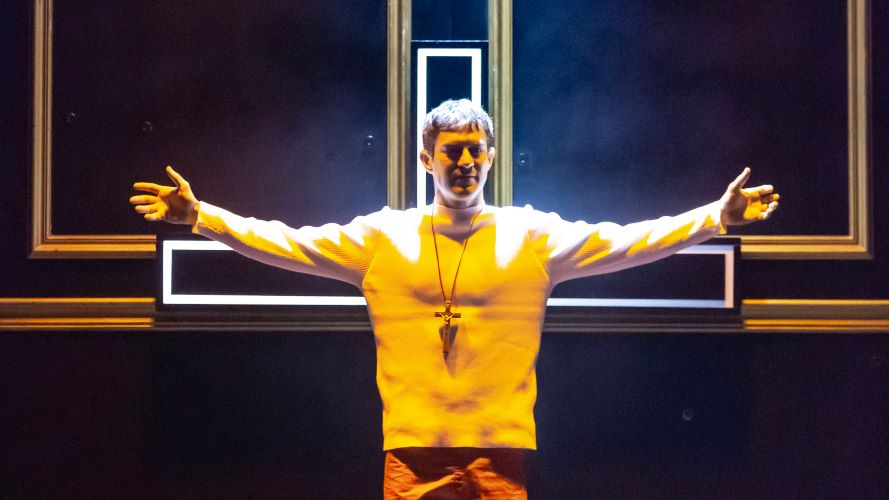
Creating and experiencing art in times of conflict and hardship raises difficult questions for artists and audiences alike. Is it the role of the theatre to entertain, and provide a necessary respite, an imaginative escape that enables the viewer to rest and return to daily life with renewed energy? Yet art has the capacity to communicate beyond words, reaching the emotions and consciousness in a manner to which no news report can ever aspire. Does not then art have the responsibility to respond to current events, to speak out against injustice, hypocrisy, corruption, oppression and all other human evils? The Cameri Theatre production of Molière’s Tartuffe, directed by Roni Brodecki, and translated by Eli Bijaoui, aims to do both.
Tartuffe was first performed in 1664 and was controversial from the start in its depiction of feigned virtue, as exemplified in its title character Tartuffe. The current production remains faithful to Molière’s original in many ways, and yet, selectively diverges from the text with profound impact. Tartuffe was written entirely in Alexandrines, a poetic meter with lines of 12 syllables each, in rhymed couplets. In the translation from French to Hebrew, although I was not able to follow the syllable count, Bijoui has retained the rhyme scheme. This lends a formal character to the play, the rhymes an invitation to remember Molière and his time, our distance from it, differences, and similarities.
Brodecki sets the play in the present day, and it opens with a loud and raucous poolside party at the lavish home of Orgon (Dror Keren). The master of the house, however, is not at home, and it appears that the rest of the family is taking full advantage of his absence. Madame Pernelle (Aya Granit-Shva) is furious at what she views as their irresponsible frolicking, admonishing them, and praising the teachings of Tartuffe (Nadav Nates), a pious man whom her son, Orgon, has brought into the home. Orgon and his mother have fallen under Tartuffe’s spell, believing him to be a teacher and role model to emulate. The wealthy Orgon views Tartuffe as his guide to a more spiritual life, but the rest of the family feels differently. Resentful of Tartuffe’s world view, in which any pleasure is deemed sinful, and even more so of his influence on Orgon, they also suspect Tartuffe of nefarious intentions.
Dror Keren is a versatile actor, whose roles range from wacky comedy to moving dramas. Here he is delightfully comic, his body language and every gesture conveying the fool that is Orgon, with a subtle grace. Ola Schur-Selektar depicts his wife Elmire, with lively resourcefulness, and, when required, an alluring, seductive presence. Orgon and Elmire’s two children remain rather flatter characters, and that is unfortunate. Not all the actors thrive in this play of rhymed couplets, it’s a challenge to avoid a singsong or artificial quality to the delivery. A real star here is Elad Atrakchi as Dorine, the saucy maid, striking the perfect balance between Dorine’s flamboyance and down-to-earth practicality. Atrakchi’s delivery of Bijoui’s clever and comic translation is sheer joy.
The most significant choice made by Brodecki is in her interpretation of Tartuffe, and the casting of Nadav Nates in the role. In some productions of Tartuffe, he is portrayed as a comic figure, a self-righteous stuffed shirt, a balloon filled with his own hot air, easily poked and deflated. Yet in this production, Tartuffe assumes a far more treacherous aspect. Nadav Nates is a handsome person, and his Tartuffe is elegant and dignified, an attractive figure who invites respect rather than ridicule, and is far more dangerous. Which is not to say that he is not funny. As Tartuffe emerges from the swimming pool and assumes a Christ-like pose, waiting for a towel – he is hilarious.
Tartuffe is quite entertaining, amusing and fun. I did find it at time a bit over-the-top and loud, but that is primarily an issue of preference. Yet there is a choice made here – which I will not reveal – which elevates the play immensely. The surprise Brodecki has created for the audience comes on like a sucker-punch, leaving the viewer amazed and bewildered. The Cameri Theatre’s Tartuffe is a terrific spin on a classic comedy, and incisive social critique.
Tartuffe
By Molière
Translated by Eli Bijaoui; Directed by Roni Brodecki; Set: Shani Tur; Costume Design: Shira Wise; Music: “Crystalim” Omer Joe Nave and Michael Moshonov; Movement: Tut Muller; Lighting Design: Keren Granek; Cast: Dror Keren – Orgon, Ola Schur-Selektar – Elmire, Nadav Nates – Tartuffe, Elad Atrakchi – Dorine, Aya Granit-Shva – Madame Pernelle, David Bilenka – Cléante, Gilad Shmueli – Damis, Chen Garti – Mariane, Gilad Merhavi – Valère





